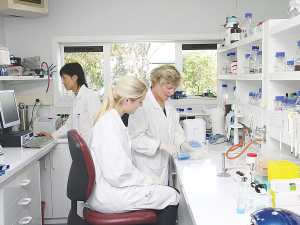NZ scientists make breakthrough in Facial Eczema research
A significant breakthrough in understanding facial eczema (FE) in livestock brings New Zealand closer to reducing the disease’s devastating impact on farmers, animals, and rural communities.
 Nearly $12m has been committed over five years to a programme looking into improvements in plant-based foods.
Nearly $12m has been committed over five years to a programme looking into improvements in plant-based foods.
Crown research institute AgResearch has received close to $13 million in government funding to help advance opportunities for New Zealand in both plant-based food ingredient and cell-based protein markets.
Nearly $12m has been committed over five years to a programme looking into improvements in plant-based foods.
It will also be used to research how a plant-based foods industry could operate in New Zealand using crops known to grow well locally, like green peas, oats and hemp.
AgResearch senior scientist Alistair Carr says arable crops already provide most of the calories in people's diets and have good sustainability and animal welfare credentials. He adds that food manufacturers have come out with many novel plant-based products.
"However, these are often highly refined and stripped of their whole-food benefits and can have hidden damage to essential amino acids. The next generation of plant-based foods will need to be prepared more sensibly with gentler handling of the inherently healthy raw materials and better guardianship of environmental impact."
Carr says AgResearch has gathered some of the brightest minds in process engineering, food science, sustainability evaluation, economic analysis and human nutrition. He says the goal is to support NZ's arable crop processors, as well as entrepreneurs in the emerging proteins sector to make New Zealand a premier supplier of high value plant-based food ingredients.
"New Zealand can participate in this opportunity by developing the science and technologies to produce unique highly functional plant foods."
Meanwhile, the second programme - with just under $1m in funding over three years, will focus on the use of technologies to advance NZ's cell-based protein industries. For example, meat that may be grown from animal cells.
AgResearch science team leader Gale Brightwell says that while it is an exciting time for cellular agriculture, there are still major challenges to overcome.
"The biggest barriers are the cost of large-scale manufacture including the use of food-grade growth media (substances in which the cells can be grown), loss of cell lines due to biological contamination and high requirements for food safety testing."
She adds that, to date, no large-scale, cost-effective technology is available to maintain sterility for cell-based protein manufacture nor an online monitoring system to detect changes in quality and safety.
This will be where the research comes in, drawing on cold plasma, hyperspectral imaging and machine learning technologies to help ensure sterility is maintained and any contamination is rapidly detected and responded to in the production process.
"The research will result in the development of new knowledge, IP and technologies that can significantly enhance the sustainability, safety, and ethical appeal of emerging NZ cellular agricultural companies," Brightwell explains.
New Zealand's new Special Agricultural Trade Envoy, Horowhenua dairy farmer, company director and former Minister of Agriculture, Nathan Guy says the Free Trade Agreement (FTA) with India is a good deal for the country.
New figures show dairy farmers are not only holding on to their international workforce, but are also supporting those staff to step into higher-skilled roles on farm.
New tractor deliveries for 2025 jumped 10% compared to the previous year, a reflection of the positive primary sector outlook, according to the Tractor and Machinery Association (TAMA).
Entries have opened for two awards in the New Zealand Dairy Industry Awards (NZDIA) programme, aimed at helping young farmers progress to farm ownership.
Federated Farmers has confirmed interim chief executive Mike Siermans to the role.
Registrations are now open for the 2026 Ruralco Golf Classic, with all proceeds from the event set to support the Mid Canterbury Rural Support Trust.

OPINION: If the hand-wringing, cravat and bow-tie wearing commentariat of a left-leaning persuasion had any influence on global markets, we'd…
OPINION: With Winston Peters playing politics with the PM's Indian FTA, all eyes will be on Labour who have the…